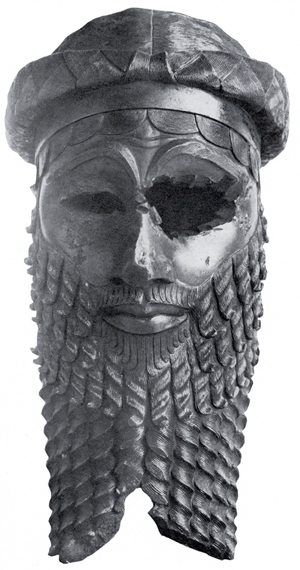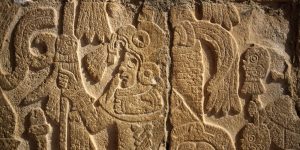Twelve thousand years ago, humans transitioned from hunter-gatherer societies to agriculture-based societies. Humans began to settle in ever larger communities, and gradually created civilizations. Neolithic villages began to flourish in Mesopotamia after 6000 B.C.E., due to its rich soil and water sources (Tigris and Euphrates rivers). The first of the civilizations that developed was the Sumerian. Many other civilizations would follow, including the Akkadian city-states, which would form to the north of the Sumerians.
According to Akkadian legend, a woman of Akkad became pregnant, carrying the illegitimate child of a temple priest. Unable to keep the child, she was forced to set her son adrift in a basket on the Euphrates River, where he was later found by a man named Akki, a gardener for Ur-Zababa, the King of the Sumerian city of Kish.1
This child would come to be Sargon of Akkad (Sargon the Great). He would grow to one day usurp the kingship of his own city of Agade, which would come to be the capital of his empire. After developing his Akkadian city of Agade and building a strong military, after 2350 B.C.E., he began to conquer. Many city-states located around Mesopotamia were involved in trading and attempting to aid one another, which often led to conflicts and war. Sargon used his army to bring these small conflicts to an end by conquering each Sumerian city-state one by one. He was viewed as a talented administrator and brilliant warrior. Sargon was wise in going on the offensive against the Sumerian city-states, conquering each, destroying all their defensive walls, as well as any enemy who stood before him. His empire is thought to have included most of Mesopotamia and parts of the Levant, besides incursions into Hurrite and Elamite territory, making him the founder of the Old Akkadian Dynasty as well as the first Mesopotamian Empire. The Old Akkadian Dynasty ruled for about a century after his death, until the Gutian conquest of Sumer. Historians believe that the Gutians were tribes of mountain people who, combined with the revolting people of the various conquered cities, were responsible for the downfall of the Akkadian Empire around 2150 B.C.E. .2
As the first emperor in history, Sargon of Akkad had much success. Despite having no prior example to follow, he was able to take over and maintain Mesopotamia for over fifty years. He financed his empire by seizing control of trade routes, taking all goods that crossed through his realm. This allowed his capital of Akkad (or Agade) to become the wealthiest and most powerful city in the world. He was able to maintain his empire by placing his best and most trusted men in positions of power in various cities. They would be appointed by Sargon himself to serve as governors and administrators in over 65 different cities. These leaders were referred to as the “Citizens of Akkad” in later Babylonian texts. Anytime Sargon took over a city, it rapidly became an Akkadian stronghold, full of Akkadian officials and troops.3 This stability throughout the empire allowed the construction of roads, a wider influence of trade, improved irrigation, as well as developments in arts and in science. Sargon standardized weights and measures for trade and daily commerce. He also managed to initiate a system of taxation and created the first postal system.

These various improvements to the lives of the people of Mesopotamia were not enough to prevent the various conquered peoples from gathering to rebel against Sargon and his administration. Being forced to stay under the rule of an emperor who defeated various groups, taking their land and goods, fueled the people to rebel. By 2150 B.C.E., the Akkadian Empire had collapsed in the midst of rebellion from within and from outside invaders attempting to take the fertile land of Mesopotamia. The story of Sargon loosing his empire to inside rebellion is only one of many. When a group of conquered people are forced to live under another’s rule, it is common for them to look for ways to strike back, overthrow those kings who often attempt to rule them well. Later rulers would improve Sargon’s administrative techniques by relying on centralized bureaucratic rule and regular taxation.4
Sargon created the very first political entity on a large scale and set the standards for all future rulers of empires. Through his unique upbringing, never meeting or knowing his parents, he was able to rise to power. Initially he was nothing but the king’s cupbearer (a butler); none expected that he would one day come to conquer and maintain the land wanted by all. Sargon of Akkad would become the topic of legendary narratives in later Assyrian and Babylonian literature, focusing on his rise to power from humble origins and his conquest of Mesopotamia. These memories of his successful deeds would later inspire conquerors to follow his example and would provide all the future people of Mesopotamia with a powerful hero to idolize.
- Ancient History Encyclopedia, September 2009, s.v. “Sargon of Akkad,” by Joshua J. Mark. ↵
- Ancient History Encyclopedia, September 2009, s.v. “Sargon of Akkad,” by Joshua J. Mark. ↵
- W. F. Albright, “A Babylonian Geographical Treatise on Sargon of Akkad’s Empire,” Journal of the American Oriental Society, Vol. 45 (1905): 193-201. ↵
- The Macmillan Encyclopedia, 2003, s.v. “Sargon of Akkad,” by Alan Isaacs. ↵



51 comments
Yadira Chavez
I really enjoyed this article, it was well written and inspiring in certain ways because of Sargon’s tragic early life. I am sure it would be a marvel to get into his mind and understand how he was the first to get the idea to start his empire. A true underdog story, especially since his reign lasted for a crazy 50 years!
Engelbert Madrid
Early civilization in history is fascinating to learn about as time moves forward. Sargon of Akkad’s birth story is almost similar to the Biblical figure Moses in Exodus. Both of them were put in a rivers by their mothers because of an issue that they couldn’t control. However, Sargon of Akkad became the first emperor in history, invading many city-states and becoming one of the most powerful leaders in early civilization. Unlike Sargon of Akkad, Moses was the leader of the Hebrews who freed them from the Egyptians.
Nathan Hartley
I think it’s interesting how well his strategy worked considering he had no one to follow. Being the first to do anything is hard, but the first emperor must have had many problems conquering new lands. I’m even more impressed that his rule lasted so long considering he was the first in the world to be a ruler.
Sebastian Carnero
Being abandoned and growing up to conquer the city where you were born, a really interesting story. It’s incredible how the first empire lasted for 50 years. Making up ways to keep the empire working must have been difficult without previous data. It is really surprising how could a butler at that time in history could rise to become the new ruler and also being able to create complex systems capable of controlling many cities with different people and resources.
Samuel Ruiz
This article reminded most of the recent content we covered in class. I remember learning about the Sumerians as well as a small portion on Akkad. The legend, regarding the woman and sending her child in the basket, reminded me of the biblical story of Moses. The success of Sargon was interesting to read about, especially since he was the first emperor. Great article!
Julian Aguero
I wonder if empires would conquer the same way if Akkad chose a different way to rule? Its astonishing that someone could rule for 50 plus years in the Akkad did. He must have felt like he could take over the entire world. Its surprising how intelligent he was especially with no precedent to follow. I wonder if others who took after him noticed that pure viciousness is not the way to rule if you want your people happy.
Johnanthony Hernandez
Great article, I had no idea of who gave rise to the Akkadian Empire or the time frame that like many legends of the ancient world was found in a basket on the Euphrates River. It’s interesting to see the rise of one of the first empires in Mesopotamia as well as how it shares a similar downfall as many ancient empires did. As well as his legacy becoming a main focal point in both Assyrian and Babylonian literature is something that I wouldn’t have thought having a connection.
Jason Garcia
Great read and interesting take on Sargon’s early life. I learned about the first empire run by Sargon and wanted to learn as much as I could about such a historical place and time. The detail in this article has more than I would have thought. It explains how he conquered the land he claimed and how he kept it under his control. Once again a great read and I hope to find out much more in the future.
Raymond Davila
This article was fascinating as it talked about Sargon the Great was the first emperor in history. I had never heard about him before but after reading this article i do have to agree with the writer that he was very successful. What surprised me was that he wasn’t just a conqueror but an intellectual person who standardized measurements and initiated a taxation system.
Brandon Martinez
To learn about the worlds first major empire is eye opening. Most people associate empires to Rome and Egypt, but this article explains how Sargon lead the first major empire and changed the world. Being the first conquerer of lands and establishing his reign throughout many lands, it it phenomenal that this is not talked about since it had such huge impact throughout history.